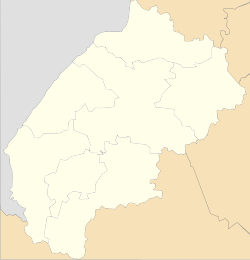Staryi Sambir (Ukrainian: Старий Самбір, IPA: [stɐˈrɪj ˈsɑmbir]; Polish: Stary Sambor, Staremiasto, Stare Miasto) is a city in Sambir Raion, Lviv Oblast of western Ukraine, close to the border with Poland. Staryi Sambir hosts the administration of Staryi Sambir urban hromada, one of the hromadas of Ukraine.[1] Its population is approximately 6,440 (2022 estimate).[2]
Staryi Sambir
Старий Самбір | |
|---|---|
 Main square | |
| Coordinates: 49°26′35″N 23°00′12″E / 49.443056°N 23.003333°E | |
| Country | |
| Oblast | Lviv Oblast |
| Raion | Sambir Raion |
| Hromada | Staryi Sambir urban hromada |
| First mentioned | 1378 |
| Population (2022) | |
| • Total | 6,440 |
| Time zone | UTC+2 (EET) |
| • Summer (DST) | UTC+3 (EEST) |
 | |
History
editThe exact date of establishment of the town is not known. Sambir, known in Polish as Sambor, was for the first time mentioned in documents in 1378. At that time, it was a private town of the noble Herburt family, part of Przemysl Land, Ruthenian Voivodeship, Kingdom of Poland. In 1501, a Roman Catholic church was opened here, and in 1553, Sambir received a town charter. In 1668, a town hall was built here, and in the early 18th century, the local church was remodelled. Until 1772 (see Partitions of Poland), Sambir belonged to Przemysl Land, Ruthenian Voivodeship. From 1772 until late 1918, Sambir belonged to Austrian Galicia. In 1880, its population was 3,482, with 1,399 Greek-Catholics, 704 Roman Catholics, and 1,377 Jews.
During the Polish-Ukrainian War, Sambir was seized by the Poles whose possession of the town was confirmed in the Peace of Riga. According to the 1921 census, the town had a population of 4,314, with 1,534 Jews. In the Second Polish Republic, it was the seat of a county in Lwow Voivodeship (until 1932). After the 1939 invasion of Poland, the town was annexed into the Soviet Union. Its Jewish residents were murdered in the Holocaust.
In the immediate postwar period, the remaining ethnic Poles were expelled.[3] Most of them settled in the Recovered Territories. Ukrainians were resettled following Operation Vistula.
Until 18 July 2020, Staryi Sambir served as the administrative center of Staryi Sambir Raion. The raion was abolished in July 2020 as part of the administrative reform of Ukraine, which reduced the number of raions of Lviv Oblast to seven. The area of Staryi Sambir Raion was merged into Sambir Raion.[4][5]
Notable people
edit- Mikołaj Zyblikiewicz (1823–1887), Polish politician and lawyer
- Maria Jarema (1908–1958), Polish painter and sculptor
- Anda Meisels Rosen, Holocaust Survivor and author of "Middle Andzia"
Gallery
edit-
Dniester River near Staryi Sambir
-
Dniester River bridge
-
Jewish cemetery
-
A view of Staryi Sambir with the Church of St. Nicholas
-
Market Square and the Town Hall, 1903.
-
Monument to Stepan Bandera
-
Old house
-
Church of St. Nicholas
-
Staryi Sambir Synagogue
-
Clinic
-
Premises of the editorial office of the newspaper
References
edit- ^ "Старосамборская городская громада" (in Russian). Портал об'єднаних громад України.
- ^ Чисельність наявного населення України на 1 січня 2022 [Number of Present Population of Ukraine, as of January 1, 2022] (PDF) (in Ukrainian and English). Kyiv: State Statistics Service of Ukraine. Archived (PDF) from the original on 4 July 2022.
- ^ Jerzy Kochanowski (2001). "Gathering Poles into Poland. Forced Migration from Poland's Former Eastern Territories". In Philipp Ther, Ana Siljak (ed.). Redrawing Nations: Ethnic Cleansing in East-Central Europe, 1944–1948. Lanham: Rowman & Littlefield Publishers. ISBN 978-0-7425-1094-4.
- ^ "Про утворення та ліквідацію районів. Постанова Верховної Ради України № 807-ІХ". Голос України (in Ukrainian). 2020-07-18. Retrieved 2020-10-03.
- ^ "Нові райони: карти + склад" (in Ukrainian). Міністерство розвитку громад та територій України.
External links
editFurther reading
edit- Weiner, Miriam; Ukrainian State Archives (in cooperation with); Moldovan State Archives (in cooperation with) (1999). "Chapter 11: Town Clips: Staryy Sambor." Jewish Roots in Ukraine and Moldova: Pages from the Past and Archival Inventories . Secaucus, NJ: Miriam Weiner Routes to Roots Foundation. p. 420. ISBY 978-0-96-565081-6. OCLC 607423469.



